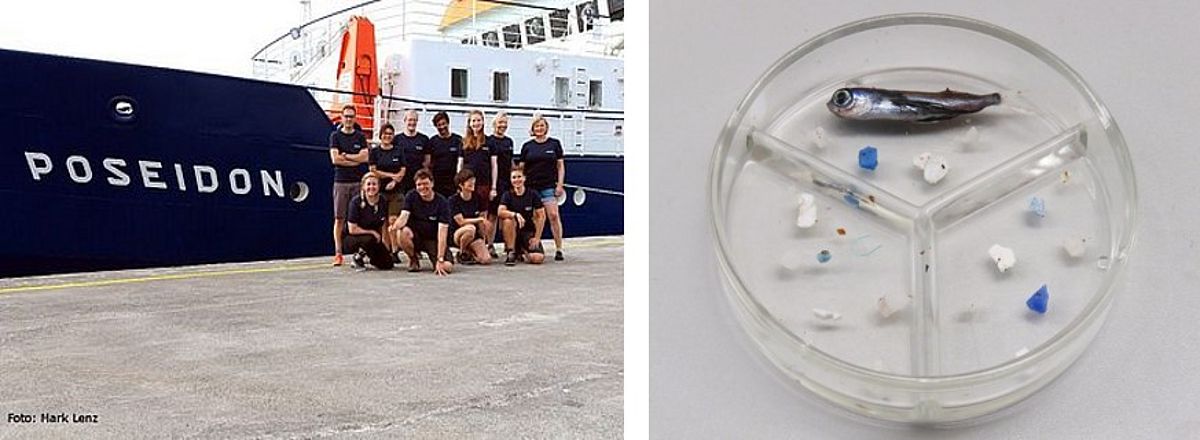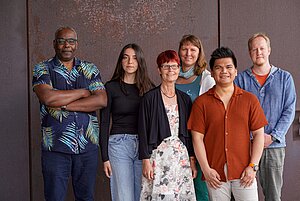Selected Publications (last 5 years)
Lips S, Schmitt-Jansen M, Borchert E (2026) Metagenomic analyses of the plastisphere reveals a common functional potential across oceans. Environmental Pollution,Volume 395,127830, https://doi.org/10.1016/j.envpol.2026.127830.
Huang J, Wiese J, Steiner LX, Rahn T, Borchert E, Hentschel U (2025). Actinospongicola halichondriae gen. nov. sp. nov., the first sponge-derived cultivated representative of a new genus within the class Acidimicrobiia. (submitted)
Turak O, Gagsteiger A, Upadhyay A, Kriegel M, Salein P, Agarwal S, Borchert E, Höcker B (2024) A third type of PETase from the marine Halopseudomonas lineage. biorxiv doi.org/10.1101/2024.12.31.630877
Steiner LX, Wiese J, Rahn T, Borchert E, Slaby BM, Hentschel U (2024) Maribacter halichondriae sp. nov., isolated from the marine sponge Halichondria panicea, displays features of a sponge-associated life style. Antonie Van Leeuwenhoek 117(1):56. doi: doi.org/10.1007/s10482-024-01950-4
Tora D, Hentschel U, Lips S, Schmitt-Jansen M, Borchert E (2023) 16S rRNA gene sequence analysis of the microbial community on microplastic samples from the North Atlantic and Great Pacific Garbage Patches. Afr. J. Microbiol. Res. 17(5):123-138. doi: doi.org/10.5897/AJMR2022.9682
Galarza-Verkovitch D, Turak O, Wiese J, Rahn T, Hentschel U, Borchert E (2023) Bioprospecting for polyesterase activity relevant for PET degradation in marine Enterobacterales isolates. AIMS Microbiology 9(3):518-539. doi: doi.org/10.3934/microbiol.2023027
Borchert E, Chow J, Hentschel U, Streit WR (2022) Marine Mikroorganismen für den Plastikabbau. Biospektrum 28:594-596. doi: doi.org/10.1007/s12268-022-1848-9
Fernandez-Lopez L, Sanchez-Carrillo S, Garcia-Moyano A, Borchert E, Almendral D, Alonso S, Larsen Ø, Werner J, Makarova KS, Plou FJ, Dahlgren TG, Sanz-Aparicio J, Hentschel U, Bjerga GEK, Ferrer M (2021) The bonde-degrading enzyme machinery: From multi-component understanding to the treatment of residues from the meat industry. Comput. Struct. Biotechnol. J. 19:6328-6342. doi: doi.org/10.1016/j.csbj.2021.11.027
Borchert E, Hammerschmidt K, Hentschel U and Deines P (2021) Enhancing microbial pollutant degradation by integrating eco-evolutionary principles with environmental biotechnology. Trends Microbiol. 29(10):908-918. doi: doi.org/10.1016/j.tim.2021.03.002
Borchert E, Garcia-Moyano A, Sanchez-Carrillo S, Dahlgren TG, Slaby BM, Bjerga GEK, Ferrer M, Franzenburg S, Hentschel U (2021) Deciphering a marine bone degrading microbiome reveals a complex community effort. mSystems 6(1):e01218-20. doi: doi.org/10.1128/mSystems.01218-20
Funding
- EU Horizon project XTREAM – Sustainable exploration and biodiscovery of novel products and processes from extreme aquatic microbiomes to expedite the circular bioeconomy
https://www.norceresearch.no/en/projects/xtream-sustainable-exploration-and-biodiscovery-of-novel-products-and-processes-from-extreme-aquatic-microbiomes-to-expedite-the-circular-bioeconomy
- Helmholtz InnoPool project AI MareExplore – Utilizing AI for marine enzyme discovery to address human-made grand challenges
- BMBF BioProMare: PLASTISEA – Harvesting the marine plastisphere for novel and innovative biotechnology concepts
Harvesting the Marine Plastisphere for Novel and Innovative Biotechnology Concepts
https://www.researchgate.net/project/PLASTISEA-Harvesting-the-marine-Plastisphere-for-novel-cleaning-concepts
- ERA-NET Marine Biotechnology: ProBone – New tools for prospecting the marine bone-degrading microbiome for new enzymes
http://www.marinebiotech.eu/ProBone






